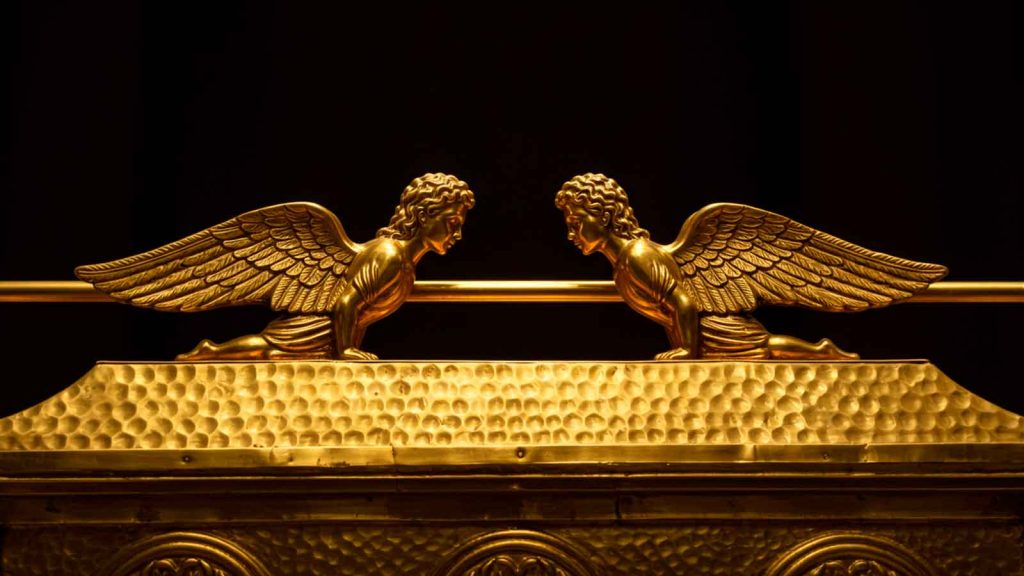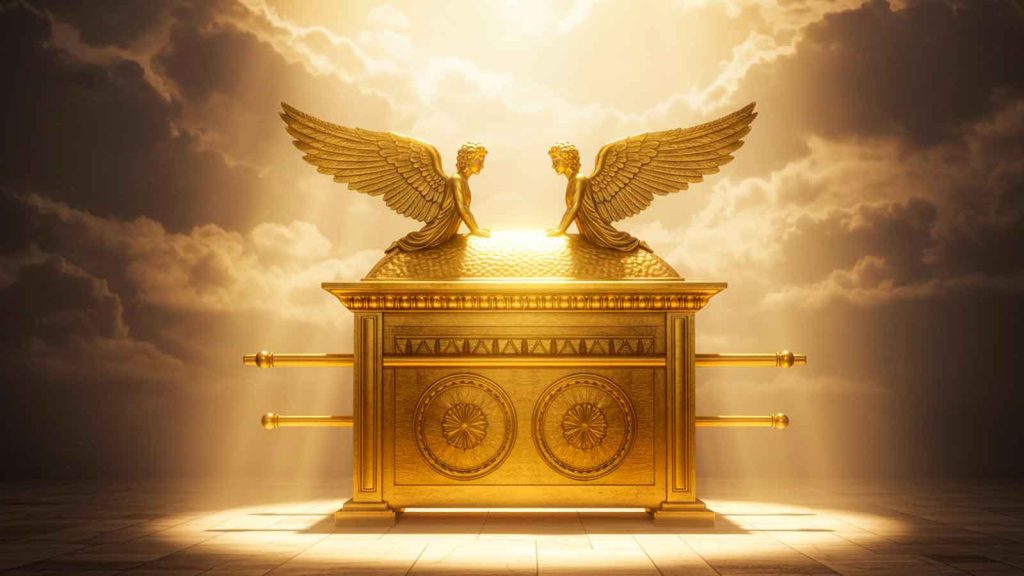Exodus 25:18 brings one of the most symbolic instructions about the construction of the Tabernacle, revealing details about the Ark of the Covenant and the two cherubim that were to be molded at its ends. Much more than a simple manufacturing order, this verse hides layers of spiritual, theological, and practical meaning that remain relevant to this day.
18 Make two cherubim out of hammered gold at the ends of the atonement cover.
Exodus 25:18

Understanding the context of Exodus 25:18
The importance of the Tabernacle
Before understanding what Exodus 25:18 represents, it is necessary to understand what the Tabernacle was. It was a mobile structure created for the Hebrew people to worship and maintain communion with God during their journey through the desert. Every detail of this construction carried deep meaning.
The center of worship
At the heart of the Tabernacle was the Ark of the Covenant. This sacred object represented the covenant between God and His people. Inside the Ark were essential elements such as the tablets of the law. On top of the Ark was the atonement cover, and at its ends, the cherubim described in Exodus 25:18.
Exodus 25:18 and the command of the cherubim
The structure of the cherubim
According to the instruction in Exodus 25:18, two cherubim were to be molded from hammered gold, one on each end of the Ark’s cover. They symbolized reverence, protection, and holiness. Their outstretched wings covered the atonement cover and formed a sacred space.
Unity of the piece
The cherubim were not separate attached pieces but were part of the Ark’s cover itself, molded from a single piece of gold. This shows the level of perfection and unity required in this service. Exodus 25:18 expresses meticulous care with every detail.
The spiritual symbolism of Exodus 25:18
Purity and excellence
Hammered gold symbolizes purity, value, and perfection. It was not just about aesthetics but about offering the best. Exodus 25:18 conveys the idea that everything done for God should be with total dedication.
The invisible presence
Between the two cherubim was the most sacred place: the space where the divine presence manifested. This configuration conveyed the idea that, although invisible, God’s presence was at the center of everything, guarded and exalted.

Practical applications of Exodus 25:18
Strive for excellence in everything
Reflecting on Exodus 25:18, we are challenged to offer our best in everything we do, especially in spiritual matters. God’s standard is always high, and He values effort, zeal, and true dedication.
Reverence as a lifestyle
The image of the cherubim represents reverence, a value often lost today. Exodus 25:18 reminds us of the importance of maintaining respect and holiness when approaching what represents the divine.
Centrality of faith
Just as the cherubim were facing the center of the atonement cover, our gaze should remain fixed on God. Exodus 25:18 is a call to faith-centered living, even amid the chaos and distractions of the modern world.
The Ark of the Covenant and its symbolism
Central element of the journey
The Ark was not just a liturgical object. It accompanied the people, was carried into battles, and represented the constant divine presence among the people. What we see in Exodus 25:18 reinforces this active and continuous presence.
Inspiration for communion
The detailed design of the Ark and its components teaches us about the importance of communion. Everything was made with purpose and intention. The same attention to detail we see in Exodus 25:18 should be applied to our spiritual life.
The influence of Exodus 25:18 on spirituality
Call to holiness
Nothing in the Tabernacle was common. Every inch had a reason and a value. The construction of the cherubim, according to Exodus 25:18, was part of the call for the people to live in holiness, set apart for a greater purpose.
Expression of true worship
The cherubim symbolized more than figures; they were living representations of worship. Their bowed faces and outstretched wings speak of a posture everyone should have before the sacred. Exodus 25:18 inspires us to live a life that exalts the presence of God.
Technical and spiritual details of the piece
Why hammered gold?
The use of hammered gold indicates the material was shaped with effort, without seams. It’s a perfect metaphor for spiritual integrity. Exodus 25:18 reflects this concept of something flawless, continuous, worthy of God’s presence.
Symmetry of the cherubim
The two angelic figures were mirror images, facing each other. This shows harmony and balance. In everything we do spiritually, Exodus 25:18 inspires us to seek order and symmetry.
Modern reflections based on Exodus 25:18
Timeless relevance
Even though it was an instruction given millennia ago, Exodus 25:18 carries timeless principles. Purity, reverence, dedication, and centrality are values that never age.
Inspiration for daily life
From the way we work to how we relate to others, everything can reflect the teachings of Exodus 25:18. Every action can be an act of worship, a gesture of devotion.
The value of obedience
The instruction was precise, and the people followed it to the letter. This shows the value of obedience. Exodus 25:18 reminds us that following divine directions brings order, presence, and blessing.
Curiosities about Exodus 25:18
Number of cherubim
Two cherubim were molded, representing balance and testimony. The number two has strong biblical symbolism, related to unity and confirmation.
Positioning
The cherubim faced each other, with wings outstretched upward. This reinforces the idea that worship should be focused on God, not on oneself.
Handcrafted work
The making of these pieces required rare skill. It wasn’t done hastily. This reinforces the idea that everything made for God should be done with excellence, as we see in Exodus 25:18.
The visual and spiritual impact of the cherubim
Inspiration for sacred art
The image of the cherubim described in Exodus 25:18 influenced many artists throughout history. Paintings, sculptures, and liturgical decorations were inspired by this model.
Symbolic teaching
The shape and material used for the cherubim teach profound truths. Biblical art was not merely decorative, but functional and symbolic. Exodus 25:18 proves this.
FAQ
What was the role of the cherubim on the Ark?
They represented reverence, holiness, and the divine presence over the atonement cover.
Why was hammered gold used?
Because it symbolized purity, value, and perfection. It was molded manually, without seams.
What is the spiritual meaning of the cherubim’s positioning?
Their gaze toward the center represents focus on the divine presence and spiritual balance.
What do we learn from this instruction?
That everything we do for God must be done with zeal, purity, and excellence.
Is Exodus 25:18 still relevant today?
Yes, because its principles of true worship, holiness, and dedication remain alive.
Conclusion
Exodus 25:18 is not just a technical description of how to mold angelic figures in gold. It is a powerful representation of the holiness, reverence, and excellence that should mark our spiritual life. Every detail of this instruction carries teachings that transcend time and remain relevant today.
By understanding the depth of Exodus 25:18, we are challenged to look more carefully at what we offer to God. Worship, dedication, and respect for His presence must not be superficial. They must reflect the same care, purity, and purpose seen in the construction of the Ark of the Covenant.
More than just a piece of the Tabernacle, the cherubim symbolize the awareness that God is present, watching, and manifesting among His people. May we live with this same awareness, offering Him our best, with a bowed heart, like the cherubim guarding the sacred center of the atonement cover.
READ ALSO:
- Verses of Healing and Miracles: Strengthen Your Faith
- Blessed Good Night: Spread Faith Before Sleeping
- Proverbs 31:3 – A Wisdom Alert to Preserve Your Purpose
- Proverb 4 – Complete and Explained
FOLLOW US ON FACEBOOK
I hope this helped.